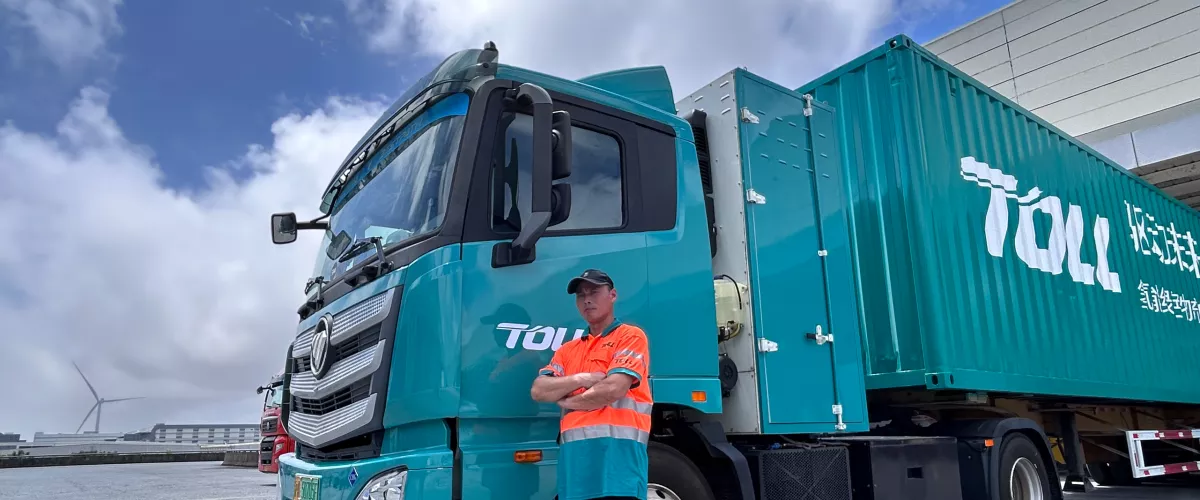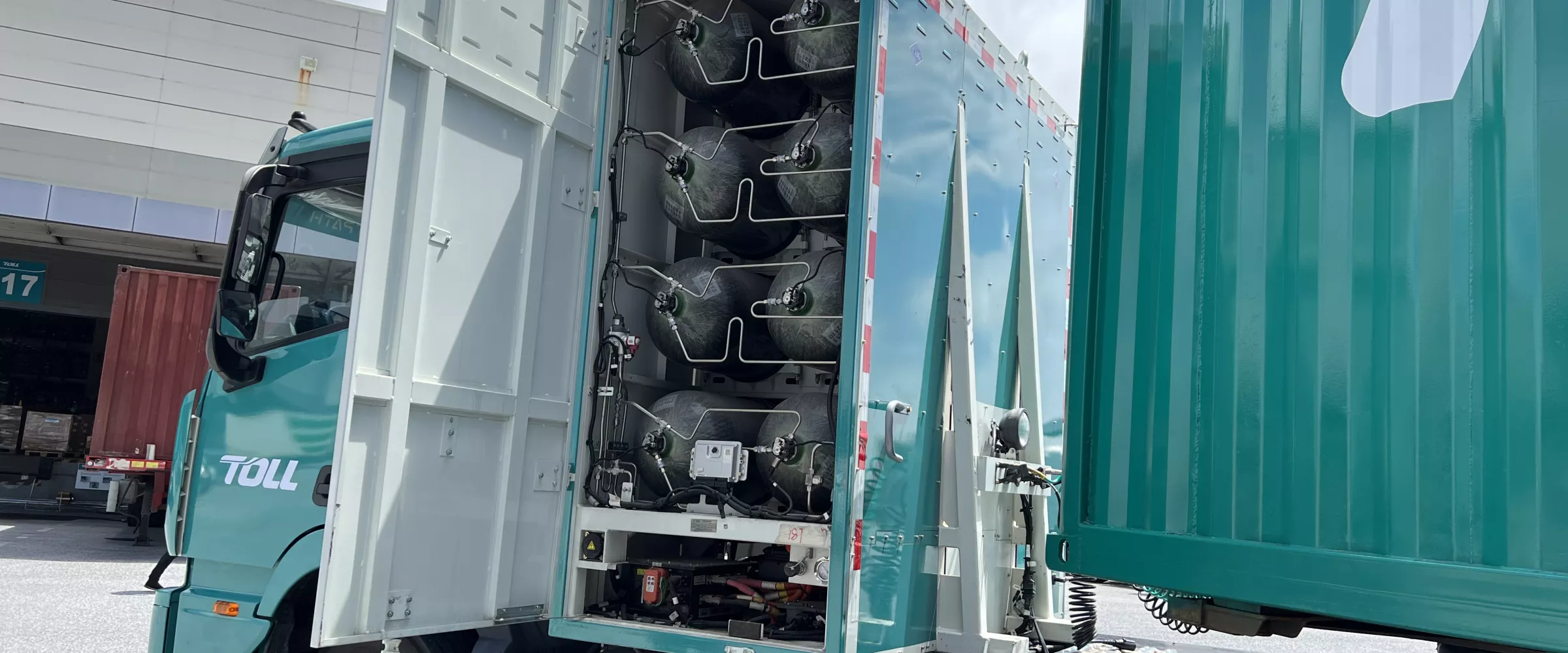
June 2024
Toll is at the forefront of tackling decarbonisation in heavy vehicle transport, leading to several exciting large-scale pilot projects and partnering with customers to trial new technologies.
Toll’s Chief Enterprise Services Officer, Anna Green, says sustainability is central to Toll’s future planning.
“For us, it’s important because, as a leader in our industry, we have an opportunity to materially change the volume of carbon emitted into our environment through the decisions we make in our business,” Anna says, adding that solutions lie in a collective approach.
Zero emissions by 2050
General Manager of Toll’s Global Fleet and Maintenance Team, Shaun O’Flaherty, says exploring more sustainable opportunities with customers has become a critical part of his role. This is driven both by customer demand and Toll’s global leadership team.
We are aligned with our parent company – Japan Post’s target to reduce carbon emission output by 46% by 2031, with net zero emissions globally by 2050.
Shaun O’Flaherty, General Manager of Toll’s Global Fleet and Maintenance Team
Comparing hydrogen electric, battery electric and sustainable fuels
“We are in the process of investigating and trialling sustainable fleet options – including battery electric and hydrogen fuel cell electric vehicles as well as sustainable fuels, such as renewable diesel,” Shaun adds.
Toll’s Managing Director, Alan Beacham, is part of the Climate Leaders Coalition (CLC), a group of cross-sectoral Australian corporate CEOs supporting the Paris Agreement commitments and setting public decarbonisation targets. Toll will lead a pilot with the CLC and a coalition of companies to trial sustainable fuel technologies operating linehaul transport between Melbourne and Sydney.
“One of the key objectives of the trial is to help Australian industry understand feasible options to help industry accelerate the decarbonisation journey,” Shaun says.
Toll is leading this research alongside joint investors from some of Australia’s largest organisations in the fuels, healthcare, energy, grocery, consumer goods, and banking sectors. The different transport types are being assessed for factors, including range, payload, fuelling or charging infrastructure, and availability to scale the technology over the next 12 months.
Along with this initiative, Toll is poised to reveal a major investment in sustainable fleet.
We expect to soon make an exciting announcement about funding for an investment in Toll’s first fleet of electric trucks. These will operate in Australia across three states and 10 sites with five customers, with the first vehicles likely to be on the road by the end of 2024.
Shaun O’Flaherty, General Manager of Toll’s Global Fleet and Maintenance Team
Hydrogen trials in Australia and China
Over in China, Toll launched its first-ever long-haul hydrogen truck in February.
“We’re operating the hydrogen vehicle on linehaul runs between a factory in Jijiang and the Toll Shanghai Lin Gang warehouse. Our reporting has estimated around 105 annual tonnes of carbon emissions abated compared with a diesel equivalent vehicle, and our customer is considering longer-term plans to adopt hydrogen vehicles across its global operations,” Shaun says.
Shaun adds these measurements are useful for the customer’s ‘Scope 3’ emissions reporting and, importantly, demonstrate that their transport partners are reducing their use of carbon.
Toll will scale up its transition of prime movers to hydrogen vehicles in China over the next two years as hydrogen refuelling infrastructure develops across the country. These are important initial investments, and hydrogen will play a leading role in decarbonising the long-distance, heavy transport fleet across key countries in Toll’s global network.
In partnership with a leading energy company, Toll will operate two hydrogen-powered prime movers in Australia, where they will transport liquid fuels and steel products across Toll’s extensive transport network in Victoria.
Three-step process
General Manager of Toll’s Mining, Oil and Gas business, Nick May, says that while the infrastructure is not yet in place for sustainable long-haul transport in remote parts of Australia, his mining customers are watching the trials closely and preparing for next steps.
The customer base is interested in sustainability in many ways. From a transport perspective, they are interested in ways to sustainably increase productivity of current vehicles, right through to considering the cutting-edge technology for zero-emissions transport from electric to hydrogen vehicles.
Nick May, General Manager of Toll’s Mining, Oil and Gas business
Nick says it’s a three-step process working with customers on their short and long-term sustainability objectives. “First, it’s about increasing productivity now. Then, it’s about considering more sustainable fuel sources using existing technology, and finally considering new fleets of hydrogen or electric solutions.”
Immediate productivity gains
From that first step perspective of productivity, Nick’s team works with a mining client that runs long-haul transport between Adelaide and the gas fields.
“We are looking at the performance-based standards vehicles, what we call PBS, and designing larger vehicles using fuel prime movers. By maximising the vehicle’s length and size, we reduce the amount of prime mover movement,” Nick says.
“Having fewer trucks on the road reduces carbon emissions and lowers cost, which serves our customer in the best way possible.”
Another approach with a Queensland mining supplier customer focuses on increasing vehicle capacity.
We move pipes on behalf of customers for drilling of gas operations, and we’re working on increasing the tonnage per vehicle. We are improving the capability of how we stack the pipes onto the truck to maximise the number of pipes per trailer. If we increase our payloads by 10%, that’s one out of 10 trucks off the road and a 10% reduction in carbon emissions.
Nick May, General Manager of Toll’s Mining, Oil and Gas business
“We are always working with customers and asking, ‘Can we do that better from an emissions, cost, and safety perspective?”
Strategic conversations
As the pilots and trials continue, customers are preparing for the next phase of technology.
Anna believes the best way forward is through collaboration.
We have early experiments with industry bodies and associations, and we’re working with governments and customers who are leaning in to solve these issues with us. This will ultimately create a supply chain industry that contributes positively both commercially and from an environmental perspective.
Anna Green, Toll’s Chief Enterprise Services Officer
“We are having conversations with our customers’ leadership and strategy teams about the technology that is coming, how it suits their business, and how we can support them from equipment acquisition through to fuel sourcing and repairs and maintenance of the new technology.”
Positive change is coming, and it’s coming fast, Anna says.
“We are excited about what we will achieve with the experiments we have identified. It is real. These things will change the game – and this is how we will change the face of the industry.”
Toll’s Future Logistics Hub
Filled with news, insights and interviews - your look into the world of logistics
Access industry insights
Stay up to date with our supply chain experts










